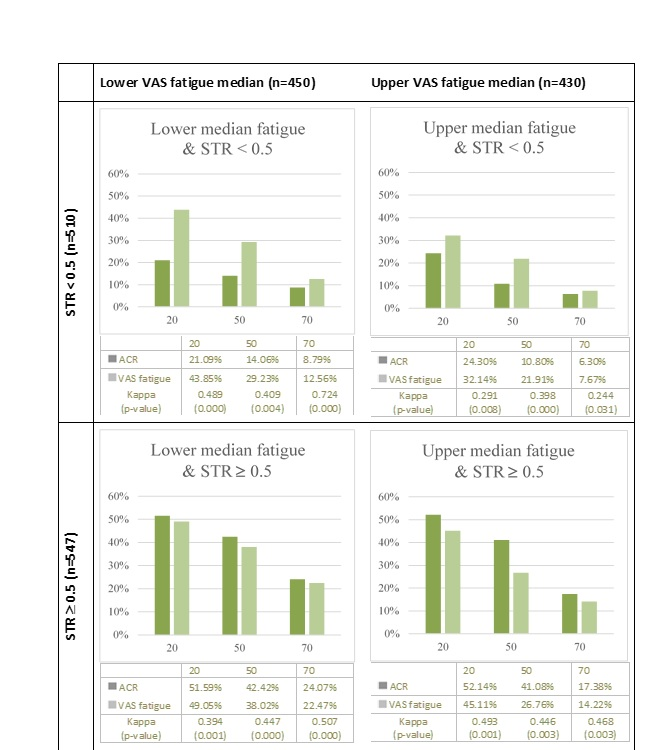Session Information
Date: Tuesday, October 23, 2018
Title: Spondyloarthritis Including Psoriatic Arthritis – Clinical Poster III: Treatment
Session Type: ACR Poster Session C
Session Time: 9:00AM-11:00AM
Background/Purpose:
Despite better control of inflammation, e.g. with biological treatments, some patients with psoriatic arthritic (PsA) continue to cite fatigue as one of the most challenging aspects of their disease as it decreases their health-related quality of life. The aim of this study was to investigate the associations between fatigue and disease activity. A second aim was to explore the agreement between VAS fatigue responses and ACR treatment responses in Danish patients with PsA.
Methods:
All PsA patients registered in DANBIO during the period from 2000 to 2015 and in treatment with their first TNFi were identified and considered eligible for participation in the study. For the assessment of associations between fatigue and disease activity patients were stratified based on number of swollen joint / tender joint ratio (STR) either being <0.5 or ≥0.5. Kappa statistics were used to assess agreement between fatigue and ACR20/ACR50/ACR70 responses, respectively at 6-month follow-up.
Results:
From 2000 to 2015, 880 patients were identified eligible for analyses. 14.22% of patients in the upper median fatigue group with STR≥0.5 showed 70% improvement in fatigue when treated with TNFi, compared to the STR<0.5 group where only 7.67% showed 70% fatigue improvement. The same applied for patients in the lower median fatigue group where 22.47% of patients with STR≥0.5 showed 70% improvement in VAS fatigue, compared to 12.56% for STR<0.5 (Figure). The kappa values between ACR20, 50, 70 and VAS fatigue responses in the upper median fatigue group with STR≥0.5 were 0.49, 0.45 and 0.47 (p<0.005), respectively (Figure). Whereas the kappa value in the lower median fatigue group with STR<0.5 were 0.29, 0.40 and 0.24 (p<0.05), respectively (Figure).
Conclusion:
Fatigue remains a dominating symptom after TNFi treatment. More patients with relatively more swollen joints (STR ≥0.5) reached improvement in both VAS fatigue and ACR responses compared to patients with relatively more tender joints (STR<0.5) showing less effect of TNFi treatment on fatigue. The agreement between ACR treatment responses and VAS fatigue responses was weak to moderate suggesting heterogeneity between experienced fatigue and joint inflammation. Our results suggest that fatigue is a clinical domain with some independence from pure disease activity, using ACR response as a surrogate for disease activity response to treatment. This observation contributes to our understanding of why it is important to have fatigue as a separate item in the PsA Core Domain set (OMERACT) and why a measure of fatigue should ultimately be in the PsA Core Measurement set.
figure
To cite this abstract in AMA style:
Jørgensen TS, Skougaard M, Hansen RL, Ballegaard C, Mease PJ, Strand V, Dreyer L, Kristensen LE. The Agreement between TNFi Treatment Responses and Fatigue Responses Is Weak to Moderate Suggesting Heterogeneity between Experienced Fatigue and Joint Inflammation: A Danish Population-Based Cohort Study [abstract]. Arthritis Rheumatol. 2018; 70 (suppl 9). https://acrabstracts.org/abstract/the-agreement-between-tnfi-treatment-responses-and-fatigue-responses-is-weak-to-moderate-suggesting-heterogeneity-between-experienced-fatigue-and-joint-inflammation-a-danish-population-based-cohort-s/. Accessed .« Back to 2018 ACR/ARHP Annual Meeting
ACR Meeting Abstracts - https://acrabstracts.org/abstract/the-agreement-between-tnfi-treatment-responses-and-fatigue-responses-is-weak-to-moderate-suggesting-heterogeneity-between-experienced-fatigue-and-joint-inflammation-a-danish-population-based-cohort-s/

